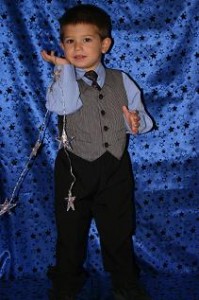I recently went to a parent teacher conference for my  six-year-old son, Cade. His teacher expressed her concern that Cade was having trouble socializing with his peers. She seemed very pleased with his intellectual ability but was very concerned about his social and even emotional skills. I was not entirely surprised to hear this since Cade had come home upset the day before. He told me he felt bad for the other kids in his class because they didn’t understand anything he was talking about. I was surprised at how bad he truly felt for the other children.
six-year-old son, Cade. His teacher expressed her concern that Cade was having trouble socializing with his peers. She seemed very pleased with his intellectual ability but was very concerned about his social and even emotional skills. I was not entirely surprised to hear this since Cade had come home upset the day before. He told me he felt bad for the other kids in his class because they didn’t understand anything he was talking about. I was surprised at how bad he truly felt for the other children.
Some parents are not aware their child is gifted until they are told by someone else, usually by their child’s teacher. But, I’ve always known that Cade was gifted – he could hold a conversation with most adults about things going on the world (mainly because he overheard the news each night while he played with his toys). I didn’t realize his intellectual abilities would hinder his social skills with other children his age, though.
It is very common for gifted children to choose to socialize with their intellectual peers rather than peers their own age. It is important for parents to realize that gifted children often have social and emotional issues that can affect their development in these areas.
A term commonly used to describe this advance in intellectual ability is “asynchronous development.” This refers to an uneven intellectual, physical, and emotional development. For instance, in average children all three areas of development progress at about the same rate compared to other children their age. However, for children with asynchronous development, development of the three areas does not progress at the same rate. For instance, a four-year-old gifted child’s progression may look like this:
Intellectual ability – age 7
Emotional ability – age 3
Physical ability – age 4
Problems that can arise from Asynchronous Development
Gifted children don’t always act their age. This can be both frustrating and confusing for parents.
- Gifted children are likely to be able to participate in adult conversations. For example, a gifted six-year-old may be discussing the problem of poverty one minute and the next minute throwing a tantrum because his brother stole his favorite toy.
- Because gifted children are intellectually advanced but not physically advanced, these children may become frustrated that they can envision accomplishing a task, but cannot physically accomplish the task.
- Intellectually understanding abstract concepts may come easily to gifted children, but dealing with these concepts emotionally does not. For instance, your child may understand the concept that his hamster died and he will no longer see it. But, he may not know how to deal with the loss of his pet emotionally, which could lead to strong concerns about death in general.
What should parents do?
It is important for parents of gifted children to realize that their children need intellectually challenging material. The needs of children who are intellectually advanced should be met just as the needs of other special children should be met. But, don’t forget that gifted children’s emotional needs must also be met. Your child may be able to discuss world hunger, but he also needs plenty of hugs and kisses “just because.”
If you suspect that your child may have an emotional disorder because of his advanced intellectual abilities, it may help to consult a professional. Child psychiatrists are experienced at diagnosing and treating children and adolescents with social and emotional problems. There are many ways to deal with asynchronous development on your own, but if you feel overwhelmed, remember you can seek help.
 Posts
Posts